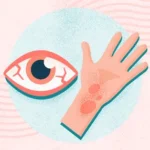Millions and millions of Americans get bug bites or stings each year. While often mild, bug bites and stings can be serious in some cases — spreading infections like Zika virus, West Nile virus, and Lyme disease, or causing life-threatening allergic reactions.
So how do you know which bugs and bug bites you should be concerned about?
Bug bites and stings come in all shapes, sizes, and severities, from itchy red lumps to pimply rashes and even large open sores. And while most bug bites or stings have some distinct hallmarks (you’ll find much more on those below), experts are quick to point out that identifying an offending bug based only on its bite or sting can be a major challenge.
“A lot of the time, we’re not able to tell what pest bit someone from the bite alone,” says Charles Allen, PhD, a professor emeritus of entomology at Texas A&M University AgriLife Extension in San Angelo.
Other bug experts agree. “Different people react differently to bites,” says Lee Townsend, PhD, a professor emeritus of entomology at the University of Kentucky in Lexington.
Both Drs. Townsend and Allen say that unless a person actually sees the insect or arthropod that caused the bite or sting, it can be difficult (or impossible) for a doctor to say for sure what type of bug was at fault — or even if a bug was at fault. Bacterial infections, eczema, and other rashes can be mistaken for bug bites.
[1]
The bottom line is that correctly identifying and treating bug bites, stings, and rashes is important. Here’s what you should know about the signs and symptoms of some of the most common bug bites found in the United States, and what to do about them.
Identifying Mosquito Bites — and How to Treat Them
Only female mosquitoes bite. And the itchy red bump that often results is caused by proteins in the mosquito’s saliva, explains Jonathan Day, PhD, a professor emeritus of medical entomology at the University of Florida Medical Entomology Laboratory in Vero Beach.
In response to these saliva proteins, the human immune system releases a compound called histamine, which helps wound-healing white blood cells flood the area of the mosquito bite. It’s this histamine that produces all of your familiar mosquito bite symptoms. “The swelling, redness, and itch — that is your body responding to those foreign proteins,” Dr. Day says.
He notes that swabbing a bite with rubbing alcohol can relieve the itch. So can hydrocortisone and over-the-counter antihistamine drugs. Of course, mosquitoes can transmit a range of viruses and infections, from Zika and West Nile to dengue fever. If you develop muscle aches, fever, or any other flu-like symptoms after being bitten, you should see a doctor.
[2]




